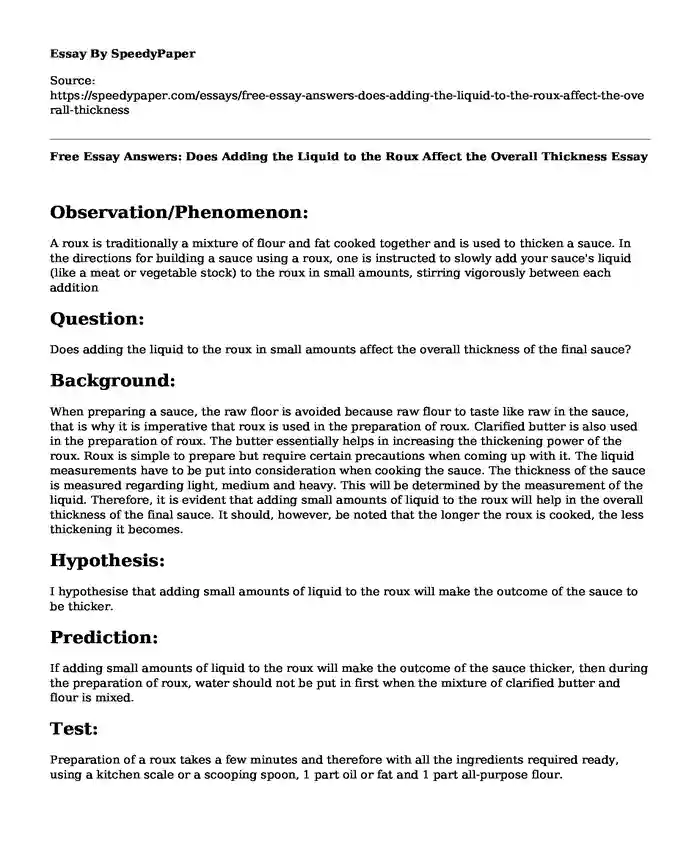Observation/Phenomenon:
A roux is traditionally a mixture of flour and fat cooked together and is used to thicken a sauce. In the directions for building a sauce using a roux, one is instructed to slowly add your sauce's liquid (like a meat or vegetable stock) to the roux in small amounts, stirring vigorously between each addition
Question:
Does adding the liquid to the roux in small amounts affect the overall thickness of the final sauce?
Background:
When preparing a sauce, the raw floor is avoided because raw flour to taste like raw in the sauce, that is why it is imperative that roux is used in the preparation of roux. Clarified butter is also used in the preparation of roux. The butter essentially helps in increasing the thickening power of the roux. Roux is simple to prepare but require certain precautions when coming up with it. The liquid measurements have to be put into consideration when cooking the sauce. The thickness of the sauce is measured regarding light, medium and heavy. This will be determined by the measurement of the liquid. Therefore, it is evident that adding small amounts of liquid to the roux will help in the overall thickness of the final sauce. It should, however, be noted that the longer the roux is cooked, the less thickening it becomes.
Hypothesis:
I hypothesise that adding small amounts of liquid to the roux will make the outcome of the sauce to be thicker.
Prediction:
If adding small amounts of liquid to the roux will make the outcome of the sauce thicker, then during the preparation of roux, water should not be put in first when the mixture of clarified butter and flour is mixed.
Test:
Preparation of a roux takes a few minutes and therefore with all the ingredients required ready, using a kitchen scale or a scooping spoon, 1 part oil or fat and 1 part all-purpose flour.
- Begin by heating of tablespoon of fat at medium heat. Do this until observation of a pinch of floor sprinkling into the oil. The oil will begin to bubble by itself.
- Then you should put about 3 and tablespoon of the floor for the formation of a thick paste. Observe the consistency of cake frosting.
- Whisk the roux continuously until the desired output is achieved.
- Add liquid to it slowly by slowly as you continue to whisk the roux.
- Make sure that it does not make the bubble too vigorously as it will cause the roux to burn rather than being brown.
- Once the roux is cooked, continue adding up the liquid to make the sauce. Addition of milk, for example, will make the roux turn white.
- To ensure that the sauce is lump-free. Make sure that the liquid ingredient being used is either cold or is at room temperature.
- Slowly whisk it to the hot roux.
- Do the whisking slowly until the roux forms into a thin paste. This is done until simmering sauce dissolves.
Possible Outcomes:
It is possible that adding small amounts of liquid to the roux would increase the thickness of the sauce which will support my hypothesis. It is possible that cooking adding a large amount of liquid will reduces the thickness of the sauce. Therefore, I would reject my hypothesis.
Cite this page
Free Essay Answers: Does Adding the Liquid to the Roux Affect the Overall Thickness. (2022, Aug 30). Retrieved from https://speedypaper.net/essays/free-essay-answers-does-adding-the-liquid-to-the-roux-affect-the-overall-thickness
Request Removal
If you are the original author of this essay and no longer wish to have it published on the SpeedyPaper website, please click below to request its removal:
- Essay Sample on the Impact of Technology
- Free Essay on Ideology and Popular Culture
- Herb Ritt's Photography of Amy van Dyken. Puallae. Art Essay Sample.
- Analytical Reading Reflection Paper Sample
- Essay Example for Free: VHA Innovative Model Analysis
- Education Essay Example: ELL Language Policies
- Free Essay. The Corruption in the Saipan Government
Popular categories





